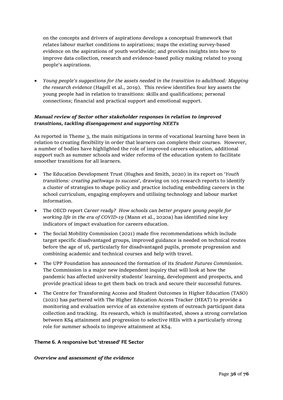
Page 36 of 76
on the concepts and drivers of aspirations develops a conceptual framework that
relates labour market conditions to aspirations; maps the existing survey-based
evidence on the aspirations of youth worldwide; and provides insights into how to
improve data collection, research and evidence-based policy making related to young
people's aspirations.
• Young people's suggestions for the assets needed in the transition to adulthood: Mapping
the research evidence (Hagell et al., 2019). This review identifies four key assets the
young people had in relation to transitions: skills and qualifications; personal
connections; financial and practical support and emotional support.
Manual review of Sector other stakeholder responses in relation to improved
transitions, tackling disengagement and supporting NEETs
As reported in Theme 3, the main mitigations in terms of vocational learning have been in
relation to creating flexibility in order that learners can complete their courses. However,
a number of bodies have highlighted the role of improved careers education, additional
support such as summer schools and wider reforms of the education system to facilitate
smoother transitions for all learners.
• The Education Development Trust (Hughes and Smith, 2020) in its report on 'Youth
transitions: creating pathways to success', drawing on 105 research reports to identify
a cluster of strategies to shape policy and practice including embedding careers in the
school curriculum, engaging employers and utilising technology and labour market
information.
• The OECD report Career ready? How schools can better prepare young people for
working life in the era of COVID-19 (Mann et al., 2020a) has identified nine key
indicators of impact evaluation for careers education.
• The Social Mobility Commission (2021) made five recommendations which include
target specific disadvantaged groups, improved guidance is needed on technical routes
before the age of 16, particularly for disadvantaged pupils, promote progression and
combining academic and technical courses and help with travel.
• The UPP Foundation has announced the formation of its Student Futures Commission.
The Commission is a major new independent inquiry that will look at how the
pandemic has affected university students' learning, development and prospects, and
provide practical ideas to get them back on track and secure their successful futures.
• The Centre for Transforming Access and Student Outcomes in Higher Education (TASO)
(2021) has partnered with The Higher Education Access Tracker (HEAT) to provide a
monitoring and evaluation service of an extensive system of outreach participant data
collection and tracking. Its research, which is multifaceted, shows a strong correlation
between KS4 attainment and progression to selective HEIs with a particularly strong
role for summer schools to improve attainment at KS4.
Theme 6. A responsive but 'stressed' FE Sector
Overview and assessment of the evidence